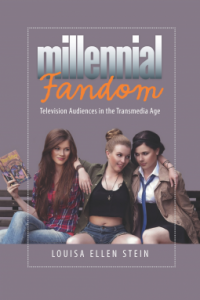 Millennial Fandom is a series of essays about Television Audiences in the Transmedia Age. By definitions – Millennials are those born between 1982 and 2004 (me!) and make up teens and young adults. The book focuses on a few shows, most of which I have watched. It starts out with Glee in ‘The Millennial Hope” section of the book. There is also “Millennial Noir” and “Millennial Transformation”.
Millennial Fandom is a series of essays about Television Audiences in the Transmedia Age. By definitions – Millennials are those born between 1982 and 2004 (me!) and make up teens and young adults. The book focuses on a few shows, most of which I have watched. It starts out with Glee in ‘The Millennial Hope” section of the book. There is also “Millennial Noir” and “Millennial Transformation”.
Millennial Hope focuses more on positive narratives while Millennial Noir focuses more on negative visions of millennials. It focuses a bit on Gossip Girl and their “OMFG” promos that were the cause of some controversy when they were first released. It also talks about females in power as seen in Gossip Girl, Veronica Mars and Pretty Little Liars (this is also a list of some of my favorite TV shows). It also focuses on how digital access helps shows – fans are able to post art, fan-fic and interact with the actors from their favorite shows.
It also talks a bit about Tumblr, which is one social media site I have never really gotten into. I have an account but I rarely use it and I just don’t “get” it, I guess. But apparently it is a big deal for many fandoms. Maybe I’m missing out?
Overall this was an interesting read and I liked that the majority of the shows mentioned were ones that I watch so that made it more fun to read. A lot of times these compilations are full of shows and movies I know nothing about but this one I have watched at least 1 episode of almost every series mentioned. (I guess that is because I am a millennial that watches too much TV!)
I received a free e-copy of this book in order to write this review. I was not otherwise compensated.
About the Book
No longer a niche or cult identity, fandom now colors our notions of an expansive generational construct—the millennial generation. Like fans, millennials are frequently cast as active participants in media culture, spectators who expect opportunities to intervene, control, and create. At the same time, long-standing fears about fans’ cultural unruliness manifest in rampant stories of millennials’ technological over-dependence and lack of moral boundaries.
These conflicting narratives of entrepreneurial creativity and digital immorality operate to quell the growing threat represented by millennials’ media agency. With fan activities becoming ever more visible on social media platforms including YouTube, Facebook, LiveJournal, Twitter, Polyvore, and Tumblr, the fan has become the avatar of our digital hopes and fears.
In an ambitious study encompassing a wide range of media texts, including popular television series like Kyle XY, Glee, Gossip Girl, Veronica Mars, andPretty Little Liars and online works like The Lizzie Bennet Diaries, as well as fan texts from blog posts and tweets to remix videos, YouTube posts, and image-sharing streams, author Louisa Ellen Stein traces the circulation of the contradictory tropes of millennial hope and millennial noir. Looking at what millennials do with digital technology demonstrates the molding impact of commercial representations, and at the same time reveals how millennials are undermining, negotiating, and changing those narratives.
This generation—and the fans it represents—is actively transforming the media landscape into a dynamic, culturally transgressive space of collective authorship. Offering a rich and complex vision of the relationship between fandom and millennial culture, Millennial Fandom will interest fans, millennials, students, and scholars of contemporary media culture alike.